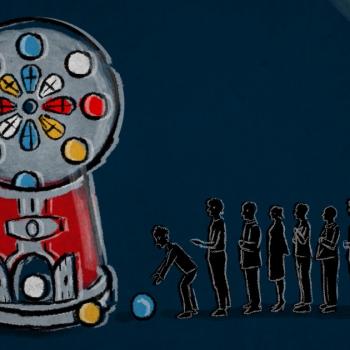Apparently all the 4th of July fireworks got a lot of couples thinking about the fireworks that weren’t happening in their bedrooms. It’s usually difficult to ever find anyone writing anything about Natural Family Planning. This week brings two different posts on the challenges of using NFP. America Magazine has an article about the struggles various couples have with the method due to everything from medical complications to failure of the method to struggles with periodic abstinence and the sexual frustration that this abstinence often entails.
Likewise, Melinda Selmys, has been musing on the challenges of NFP. She–and the comments to her post–point to some real challenges that couples experience with the method. In fact, she cheekily concludes that it is not a coincidence that about 1-2% of the population are asexual–that is, have no interest of sex with anyone of any kind–and only 1-2% of Catholics use NFP. The implication being that the only people who are really happy about having to do NFP are the ones who really don’t give a fig about sex anyway and would like a pious reason for avoiding it. Relax. She’s only kidding. Sort of.
At any rate, the upshot of both pieces is that NFP is a terrible, horrible, no-good, very bad burden on couples and the best we can do is do it grudgingly, if at all.
Serious Questions Require a Serious Response
Because these are such huge issues, I’m going to do at least two posts on the concerns raised by the authors of the articles I mentioned above. That said, blog posts can’t possibly address these serious concerns as thoroughly as they need to be addressed. I do, however, respond to all of these concerns listed above and more importantly, offer real-life, practical solutions in my book, Holy Sex! The Catholic Guide to Toe-Curling, Mind Blowing, Toe-Curling, Infallible Loving. If you’re looking for practical answers to the challenges you facing with trying to integrate your faith with your sexual life, I really encourage you to take a look. I think you’ll find real help there.
In this post, I’ll take a look at the issue of sexual frustration. In my next post, I’ll respond to the other challenges identified by the above writers.
Happy, Happy, Joy, Joy.
A lot of people have the idea that NFP is supposed to be the cause of the kind of joy usually reserved for deodorant commercials. That is, because a couple is doing NFP, they are supposed to automatically be dancing in a sunny field while smiling manically at each other as an unseen symphony orchestra plays Copland’s Hoe-Down (the song from that American Beef Council commercial).
I would like to suggest that this understanding is, um, tragically mistaken.
Harvesting the Fruit
NFP can produce a lot of good fruit–both personally and maritally–for the couples who use it but it isn’t automatic. Couples need to be taught how to cultivate, nurture and harvest that fruit and most simply aren’t. The problem is that because so many people in the Church would like to see NFP just go away and so few Catholics actually use it, most NFP program’s resources need to be invested in fighting off attacks and convincing people to give it a try. They just don’t have the support they need to do the job they would really rather be doing; that is, supporting couples in learning how to use NFP well. Even within the Church, NFP programs are like MASH units stuck on the front lines of the battle against the Culture of Death. they can do as much as they can with what they have, but they can’t do the job they’d like to be doing–the job they should be doing–because they are constantly being shot at and bombed from every direction. That is a tragedy but it is also the very real and human cost of dissent. The harder people protest NFP, the more energy NFP programs have to spend fighting for and justifying their existence in the first place. Likewise, the fewer resources they can afford to spend supporting couples and improving the method. Even so, the good news is that there are real answers to these common concerns.
Dealing with Frustration
Let’s look at the objection that NFP doesn’t work because some men—and women—find it “too frustrating.” It would be easy to belittle such comments but it would be wrong to do so. The struggle with our fallen selves is a serious matter, and there is real pain involved. Sexual frustration can be the source of great tension in a marriage and unless a couple understands it and knows what to do with it, the person’s mental health and marriage will suffer.
As I indicated above, this is a big question with a lot of different dimension. To make things more manageable, let’s focus our blog discussion on the relationship between sexual frustration and NFP. In Love and Responsibility as well as the Theology of the Body, St. John Paul II teaches that sexual attraction serves both as a reminder that we were not created to be alone and as a call to remember that we are always to work for the good of the other. In other words, as long as our sexual energy and urges inspire us to draw closer to our mate and keep our mate’s best interest in mind simultaneously, then those urges are good and godly. By contrast, if our urges cause us to be primarily concerned with getting what I “need” from my spouse no matter what, then that urge is disordered, fallen, and ungodly. Left unchecked, that urge can ultimately destroy my marriage and my soul.
NFP–What’s the Point?
As I am fond of reminding people, NFP is not, in my view, primarily a means of spacing children. It is, in my view, primarily a spiritual exercise that allows couples to accomplish 3 ends; (a) to facilitate the communication and prayer life of the couple (b) to help the couple prayerfully discern their family size and, on an ongoing basis, continue to both balance and expand all the virtues associated with the unity and procreativity of marriage and (c) help the couple achieve holiness, freedom, and true love through self-mastery and self-control.
It is point (C) that I am most concerned with here. All of us are fallen. All of us struggle with the desire to use another for our own selfish ends. For some, that struggle against selfishness is stronger than for others—but it is in all of us, and overcoming it is hard and sometimes painful. The spiritual beauty of NFP is that it highlights that struggle and challenges us to overcome our tendencies toward selfishness in ways we might not otherwise be challenged. When someone says that NFP “doesn’t work” for them because they get too sexually frustrated, I have to respond that, in fact, NFP was made for them. Why? Because any sexual urge that—if unsatisfied—threatens to blot out all the other good things about the marriage is a disordered urge that will either destroy the person, the couple, or both. Such an urge must be tamed.
Sex on the Brain.
Is this unrealistic? No. The sexual drive is part of neuroendocrine system, the same primitive brain system responsible for urges like hunger and anger. What person in his right mind would argue that intense urges to rage at people indiscriminately or eat uncontrollably should be encouraged? No one. In fact, we praise people who have mastered these urges (not repressed–mind you–but rather, can consciously choose when to use them and when not to) as being, in some ways more human than those who have not mastered them. Likewise, people who have mastered these urges—who are capable of eating or stopping as they choose or being angry or not as they choose—can be said to be more free than people who must eat any time the urge strikes or must rage any time their anger is pricked.
And here is the irony. Although society makes a distinction between the sex drive and the anger and hunger drives, the brain does not. Society praises the unfettered sex drive, while practically criminalizing people who are overweight. But the same region of the brain is responsible for all three urges. Gaining mastery over our sex drive; that is, being able to consciously choose to use it only when it is ordered toward the good of the other person, makes us more human and more free than the person who must give into every impulse for sex “or else.” Having to wrestle with this fallen nature is hard. The process is painful but it is sanctifying, and that struggle is a necessary part of the daily life of anyone who takes his or her mental and spiritual health seriously.
How Do I Know I’m Doing it Right?
We need to recognize that any frustration we feel in the process of doing NFP is a sign that NFP is working. If my muscles are sort after an intense exercise session–that is a sign that my exercise regimen is building muscle. If I am fasting or dieting, the hunger I feel is a sign that what I am doing is working physically and spiritually. Are any of these things “fun” in the common sense of the word? Of course not! But we do them because they bear great fruit. They help us look and feel and be our best.
THE SAME IS TRUE FOR THE PAINS OF NFP. When we feel those pains, we must learn to recognize them as the growing pains that accompany both our advancing spiritual maturity and our increasing capacity for true love (i.e., the ability to work for the good of the other even when doing so makes us uncomfortable). In those times when the growing pains—the disordered sexual frustration—hurt the most, we must recognize that we are not feeling a sexual urge that must be satisfied, but a selfish urge that must be contained and transformed. In response, we must draw closer to our mate, in conversation, prayer, work, and non-sexual affection, as a way of reclaiming the freedom that our fallen-ness has taken from us. Is it always easy? Absolutely not, and anyone who says otherwise is telling you a tale. But it is worth it, because with the struggle comes an increased capacity to become the lover, the person, and the child of God each of us is being called to be.
When to Get Help
All that said, there are times when because of medical concerns, or ridiculously long periods of abstinence, or pregnancy despite cautious usage of the method, or other issues, that NFP really isn’t working for a couple. In those times, special assistance is going to be required. My next post will be on how to deal more effectively with those situations. In the meantime, if you are struggling–or if you want to learn how to avoid many of the struggles common to most couples–check out Holy Sex! A Catholic Guide to Toe-Curling, Mind-Blowing, Infallible Loving. It can start you down the path of experiencing the joyful, loving, passionate, soulful and faithful sexual relationship you were meant to have.













